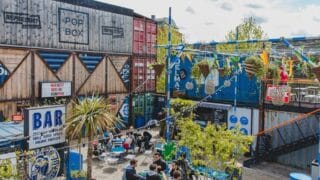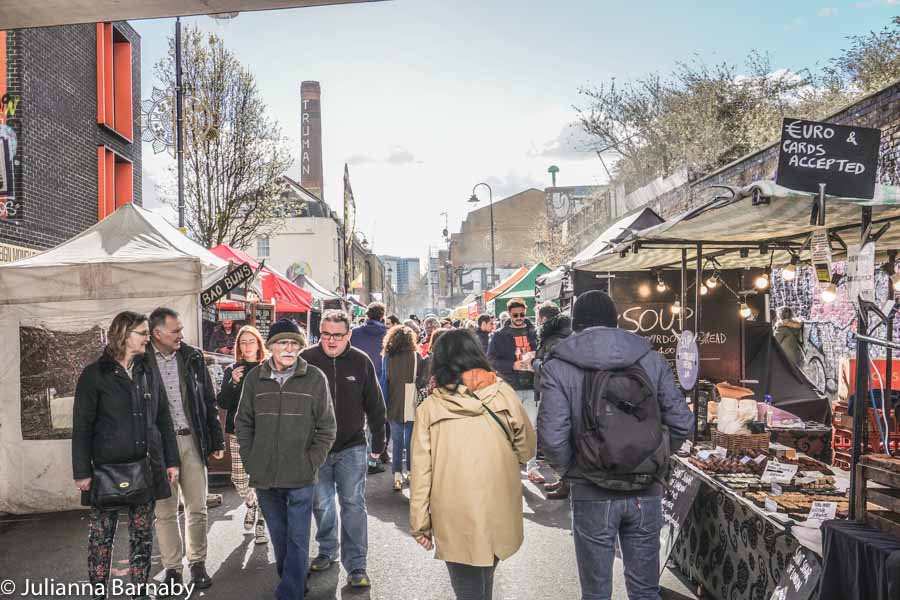
Known your loaf of bread from your Khyber Pass with our guide to speaking like a cockney.
From Eastenders to Ray Winstone, nothing is more London than cockney rhyming slang… well, apart from maybe a bit of roadman slang.
Some theories on cockney rhyming slang’s origins include it being a game, a code, or a tricksy way to confuse non-locals.
It certainly achieves that a lot of the time!
Find yourself confused when you hear cockney phrases? Don’t know your pipe and drum? The London x London cockney slang dictionary is here to save the day.
How to Speak Cockney Slang Like a Local
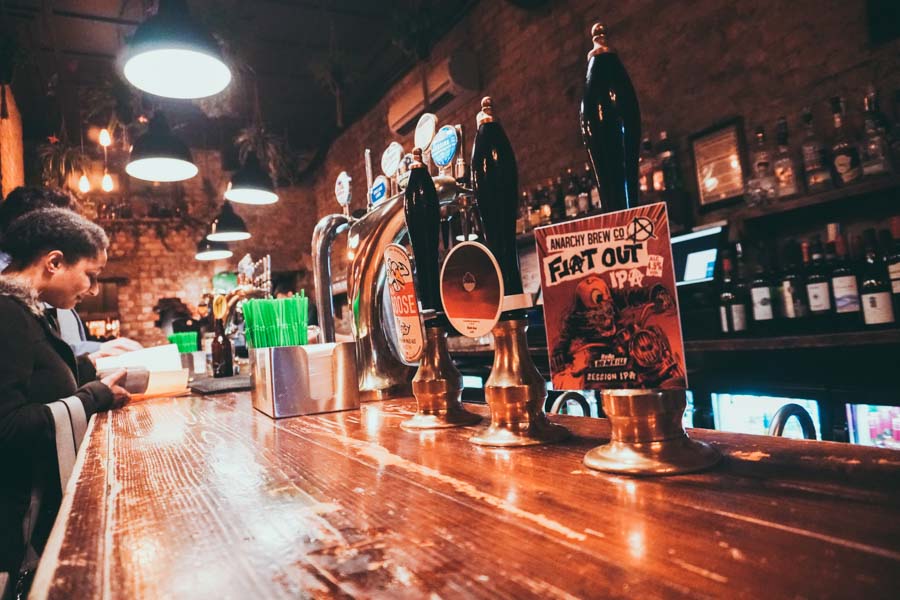
Hanging out in an East London boozer
Our top tip? Real cockneys often don’t use a whole cockney rhyming slang phrase.
Instead, they just use the first (non-rhyming) word. So, stairs, which in cockney slang is ‘apples and pears’, becomes ‘apples’ as in, ‘he’s gone down the apples’. And if someone has big feet, or ‘plates of meat’, then they have ‘huge plates’.
Confusing, right? Well, that might be the point.
Cockney Slang in Common Use
Although all the cockney slang collected here is real and used by some, a few phrases have made it into common parlance in London and beyond. If you’re in the South East of the UK, you’re likely to hear a few of the following words and phrases:
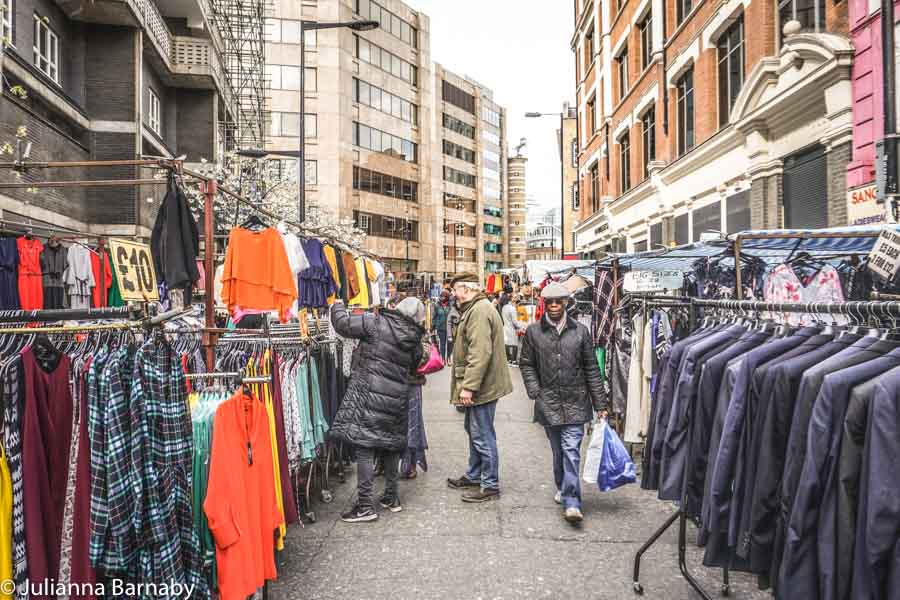
Barnet Fair – hair
This is usually shortened to ‘barnet’ and is a really common cockney slang word. You might hear, ‘Did you get your barnet done?’ or, ‘Look at the state of his barnet!’
Boat Race – face
Often just boat, as is the tradition.
Brass Tacks – facts
Another really common phrase, when someone wants to talk about the nitty gritty of an issue they’ll say ‘let’s get down to brass tacks’, or ‘what are the brass tacks’. Could be a useful one for any dodgy business dealings you get involved in down the market!
Bread and Honey – money
Get that bread! This one has caught on in many ways, so feels quite intuitive.
Bristol City – breasts
A little lewd, admittedly, ‘Look at the Bristols on her’ would probably have been heard in many a pub a few years ago. Hopefully, people are a little more respectful these days, but at least you’ll know what it means if you hear it.
Brown Bread – dead
If you’re an anglophile you will have heard this before – ‘he’s brown bread’ is a favourite of gangster movies and gritty East End period dramas alike.
Bubble Bath – Laugh
Used more in a derisive, irritated and threatening tone than when cockneys are having fun, ‘You’re having a bubble mate, meaning, ‘You’re having a laugh,’ or ‘You must be joking!’ is something said day to day in East London and beyond when someone can’t believe the cheek of you.
Butcher’s hook – a look
‘Have a butchers at that!’ said literally every cockney at some point, when showing a mate something interesting.
Half-inch – pinch
Hopefully you won’t find yourself around a whole lot of actual thievery in London, but you might have someone asking to ‘half inch one of your chips’ if they want a bite of your dinner. Half inch means pinch, which means to steal something.
China plate – Mate
In cockney rhyming slang, ‘me old china’ means a really good friend. So, if someone refers to you as their china, you’ve done well.
Cream crackered – Knackered
‘I’m cream crackered’ is often said after a long day, and now we’re writing it down it seems pretty silly… but you’re bound to hear it in London all the same.
Pork pies – Lies
This one is so popular it’s used all over the English speaking world. In some places, it has become porkie pies or even porkie pines.
Cockney Rhyming Dictionary

We promised you 101 words and phrases, so we’re not stopping with the most common. Here’s the best of the rest of cockney rhyming slang, arranged by category so you can easily find what you’re looking for.
Cockney Phrases: The Body
Jam tart – Heart
Hampsteads – Teeth (This one derives from the London place name Hampstead Heath, which rhymes with teeth)
Chalfont St. Giles – Piles
Chalk Farm – Arm
Plates of Meat – Feet
Loaf of bread – Head
Lump of lead – Head
Mince pies – Eyes
North and south – Mouth
Orchestra stalls – Balls
In and out – Snout (as in nose)
Life and death – Breath
Bottle and glass – Arse
Khyber Pass – Arse
Sage and onion – Bunion
Boiled beef and carrots – Claret (itself slang for blood)
Bottle of beer – Ear
Fruit and nuts – Guts
Oliver Hardy – Lardy (fat)
Clothes Pegs – Legs
Toby Jugs – Lugs (that’s ears, to most people)
Pipe and drum – Bum
Mickey Bliss – Piss (as in take the Mickey)
Cockney Phrases: People
Baker’s Dozen – Cousin
Barnaby Rudge – Judge
Skin and blister – Sister
Bricks and Mortar – Daughter
Cows and Kisses – Missus (wife)
Trouble and Strife – Wife
Bottle and stopper – Copper (cop, policeman)
Dunlop tire – Liar
Old bag – Hag (or any unpleasant old woman)
Septic tank – Yank (as in American)
Dustbin lid – Kid
Cockney Phrases: Clothing
Whistle and flute – Suit (of clothes)
Tomfoolery – Jewellery
Alan Whickers – Knickers (for the non-British among you, that’s women’s underwear)
Ascot Races – Braces
Dicky Dirt – Shirt
Daisy Roots – Boots
Dinky Doos – Shoes
Irish pig – Wig
Isle of Wight – Tights
Lionel Blairs – Flares
Peckham Rye – Tie
Round the houses – Trousers
Kettle and hob – Watch (as in fob watch, which is where the rhyme is)
Lucy Locket – Pocket
Almond Rocks – Socks
Cockney Phrases: Eating and Drinking
Fisherman’s daughter – water
Hank Marvin – Starving
Loop the loop – Soup
Rosy lee – Tea
Roast pork – Fork
Rub-a-dug – Pub
Ruby Murray – Curry
Vera Lynn – Gin
Army and Navy – Gravy
Borrow and beg – Egg
Satin and silk – Milk
Pig and roast – Toast
Near and far – Bar
Battlecruiser – Boozer
Rub a dub dub – Pub
Give and take – Cake
Chewy toffee – Coffee
Brahms and Liszt – Pissed (as in very drunk)
Cockney Phrases: Weather
Currant bun – Sun (also the Sun newspaper)
Mork and Mindy – Windy
David Starkey – Parky (this means cold)
Peas in the pot – Hot (shortened to ‘peas’ or ‘peasy’)
Taters in the mould – Cold (shortened to ‘taters’)
Vincent Price – Ice
Weasel and stoat – Coat
Red’n’yella – Umbrella
Ache and pain – Rain
Cockney Phrases: Money and Numbers
Lost and found – A pound
Cock and hen – Ten, or a tenner
Bag of sand – A grand (1,000 pounds)
Jeffrey Archer – Two grand (2,000 pounds, allegedly a bribe Archer took)
Lady Godiva – A fiver (5 pounds)
Cow’s calf – 50 pence (or, half of a pound, which is where the rhyme comes in)
Gregory Peck – Cheque
Bottle of glue – Two
Holy sea – Three
Stand in awe – Four
Fiddle sticks – Six
Exeter and Devon – Seven
Garden gate – Eight
Coal mine – Nine
Cock and hen – Ten
Hell and heaven – Eleven
Dig and delve – Twelve
Letter Sorting – Fourteen
Muscles a plenty – Twenty
Greengages – Wages
Sausage and mash – Cash
Rattle and clank – bank
Cockney Phrases: Miscellaneous
Cut and carried – Married
Cop a flower pot – Cop it hot (as in to get in serious trouble, usually with the law)
Crowded space – Suitcase
Lump of ice – Advice
Oily rag – Fag (as in cigarette)
Penny-come-quick – A trick
Bread and cheese – sneeze
Once a week – Beak (as in a magistrate)
Custard and jelly – Telly (as in television)
Stand to attention – Pension
Short a sheet – In the street (as in homeless)
Yet to be – Free (as in without cost, or out of prison)
Box of toys – Noise
Bob Hope – Soap
Kick and prance – Dance
Rabbit and pork – Talk
Darby and Joan – Moan
Barney Rubble – Trouble
Duke of Kent – Rent
Bubble and Squeak – Greek
Vera Lynn – Skin (as in cigarette paper)
Adam and Eve – Believe (as in: Would you Adam and Eve it?)
Pen and ink – Stink
Dog and bone – Phone
Jack Jones – Alone
Cobbler’s awls – Balls (as in bollocks – meaning rubbish or nonsense; ‘he’s talking bollocks’)
Bird and Lime – Time (as in doing time in prison; he’s doing a bird for half inching an Archer)
A History of Rhyming Slang
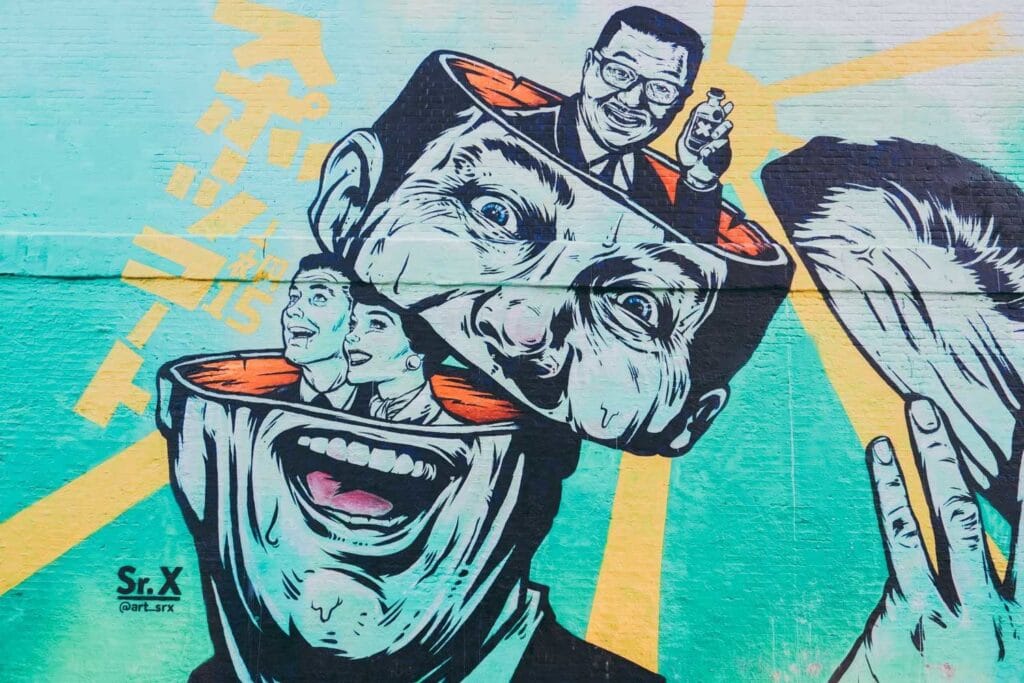
As you have probably noticed, cockney slang is very varied. Some cockney phrases have endured for a century or more, while others have been added much later or mutated over the years. That’s because, like any language, cockney rhyming slang is constantly evolving.
The slang originated in the East End in the mid 19th-Century, probably amongst dock workers and market traders.
Up until the mid-20th-Century, it was used in the East End underground in an attempt to confuse the police and non-locals alike, which is why there’s a slightly angry edge to some cockney phrases, and a lot of words for arse, money, and the pub.
But even as it was being used as a kind of code, rhyming slang spread to South London and out to Essex and other areas that are now Greater London. As it spread, it changed, which is why it has so much variety today, with some phrases (like Jeffrey Archer, or just ‘Archer’ for two grand) emerging only in the last couple of decades.
In fact, over the last couple of centuries cockney slang has become so pervasive that terms like ‘barnet’, ‘porkie pie’, and ‘hag’ can be heard all over the UK and even beyond. Which makes sense, it’s such a fun way of communicating.
Remember, the rhymes work best in a cockney accent so if something doesn’t make sense try thinking about it with more glottal stops, dropped ‘T’s and ‘H’s, and long ‘A’s.
Pearly Kings and Queens
Some of the most enthusiastic speakers of cockney slang are London’s pearly kings and queens.
If you’ve seen a pearly king or queen on the tube, you’ll remember the encounter. It’s hard to forget someone in a black suit and flat cap decorated head to toe in mother of pearl buttons, after all.
The pearly monarchy follows a long tradition that dates back to at least 1875, but probably much further. The legend goes that Henry Croft, a workhouse boy, became fascinated by the market traders or ‘costers’ of East London.
They spoke in cockney slang, and followed a community leader they referred to as a ‘king’. They also lined their clothes with mother of pearly buttons to indicate how successful they were.
This has probably all been simplified over time, but Croft is said to have come across a shipment of mother of pearl buttons wrecked on the banks of the thames. This is what made the first pearly king and queen costumes.
Croft’s pearly kings and queens became charity leaders, based on the caring and commitment community he admired in the costers. This was formalised over the years, and eventually every London borough got a pearly king or queen, and many still have them today.
The pearly kings and queens of London still wear their costumes for ceremonial purposes, and carry out charity and community work including cultural education with London children. If you catch one of them in town (not too rare an occurrence), you can probably practise your cockney slang on them.

